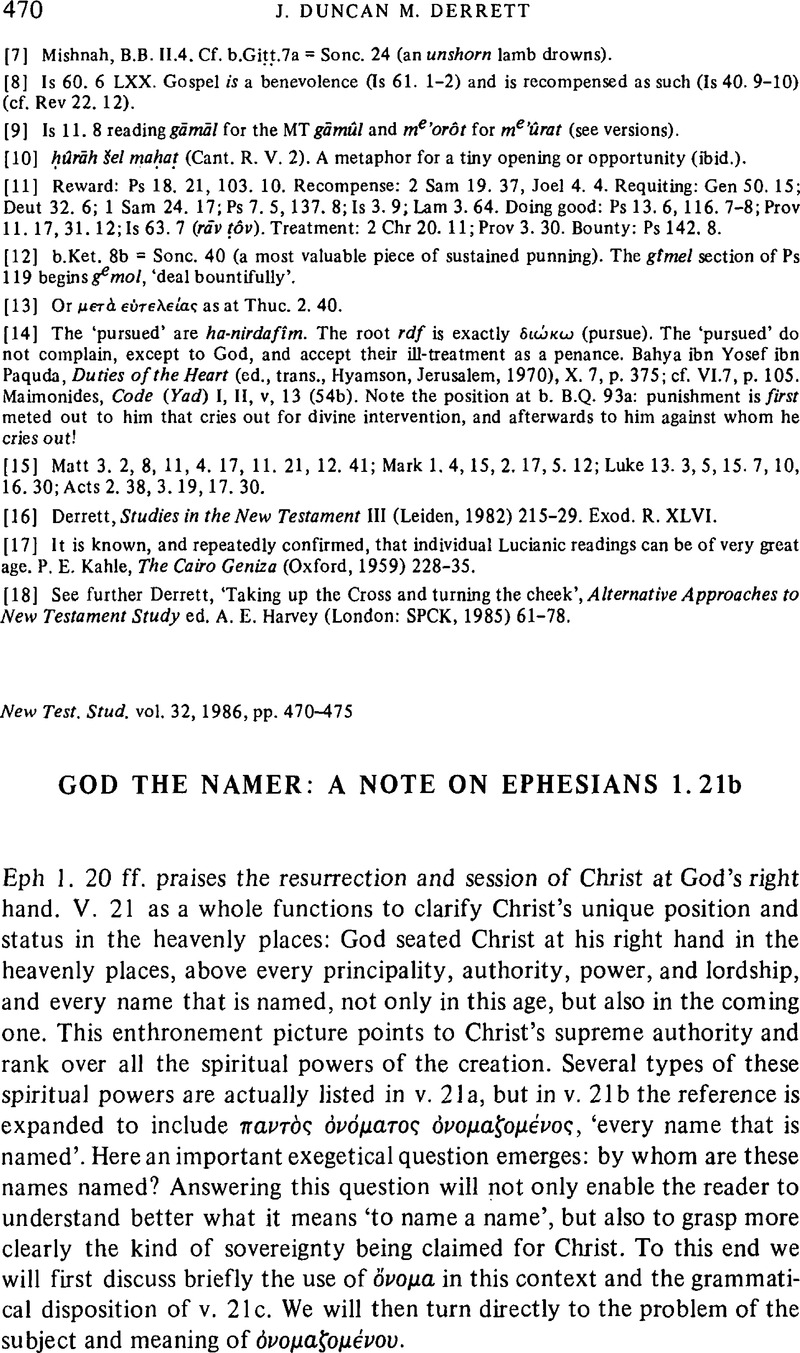No CrossRef data available.
Published online by Cambridge University Press: 05 February 2009

[1] Bauer, W., Arndt, W. F., Gingrich, F. W., and Danker, F., A Greek-English Lexicon of the New Testament and other early Christian Literature, 2nd ed. (Chicago/London: U. of Chicago Press, 1979) 571.Google Scholar
[2] Cf. Meyer, H. A. W., Meyer's Commentary on the New Testament, Bible Student's Library (New York/London: Funk and Wagnalls, 1884) 344.Google Scholar
[3] In both Judaism (especially the Apocalyptic literature) and Hellenism the belief in such angelic and spiritual beings was widespread and an accepted aspect of sophisticated as well as popular religious thought. For discussion see the bibliography in Barth, M., Ephesians 1–3, Anchor Bible 34 (Garden City, NY: Doubleday, 1974) 413 f.Google Scholar The list here may be compared to other NT lists: e.g. Rom 8. 38; 1 Cor 2. 6–8; Ga14. 3,9; Col 1. 16, 2. 8; Eph 6. 12. There seems little point, however, in trying to categorize these powers into a rigid hierarchical system. This does not mean that such a classification did not exist, or that it was insignificant; it means simply that we do not have sufficient data upon which to make a decision. Άρχή and έξουσια sometimes refer to earthly powers (e.g. Tit 3. 1; cf. Rom 10. 3). Abbott, T. K. (A Critical and Exegetical Commentary on the Epistles to the Ephesians and to the Colossians, ICC [T. & T. Clark, 1897] 33Google Scholar) thinks that our passage has earthly and spiritual powers in view. But the context does not concern Christ's role in creation (contrast Col 1. 16), but his exaltation in the heavenly places. Here Christ's rule is defined vertically, making reference to earthly powers unnecessary, since authority over the highest powersincludesauthority over subordinate ones. Also other references in Eph 2. 2, 3. 10, and 6. 12 focus on spiritual powers.
[4] For literature and discussion see Bietenhard, H., õνομα, όνομάζω κ.τ.κ, TDNT 5: 242–83Google Scholar and also ‘Name’, NIDNTT 2: 648–56.
[5] Ephesians, , New Century Bible (London: Oliphants, 1976) 72–3.Google Scholar
[6] Paul's, Letters from Prison, New Clarendon Bible (Oxford: Oxford U. Press, 1976) 47.Google Scholar
[7] Cf. Bietenhard, , TDNT 5: 253–4Google Scholar and NIDNTT 2: 649.
[8] ibid. Cf. also Anderson, A. A., Psalms (73–150), New Century Bible Commentary (London: Marshall, Morgan, & Scott, 1972) 945.Google Scholar It is likely that the stars were considered here as celestial beings.
[9] See, e.g. Westermann, C., Isaiah 40–66, Old Testament Ubrary (Philadelphia: Westminster, 1969) 158 f.Google Scholar
[10] The translation is from Pritchard, J. B., Ancient Near Eastern Texts Relating to the Old Testament, 2nd ed. (Princeton: University Press, 1955) 315.Google Scholar See also Muilenburg, J., ‘Isaiah, 40–66’, Interpreter's Bible, Vol. 5 (Nashville, Abingdon, 1956) 523.Google Scholar
[11] Westermann, , Isaiah 40–66, 158Google Scholar; Muilenburg, , Interpreter's Bible, 5: 523.Google Scholar
[12] The translation is from Charles, R. H., The Book of Enoch (London: SPCK, 1917) 66.Google Scholar See also, Bietenhard, , TDNT 5: 267.Google Scholar